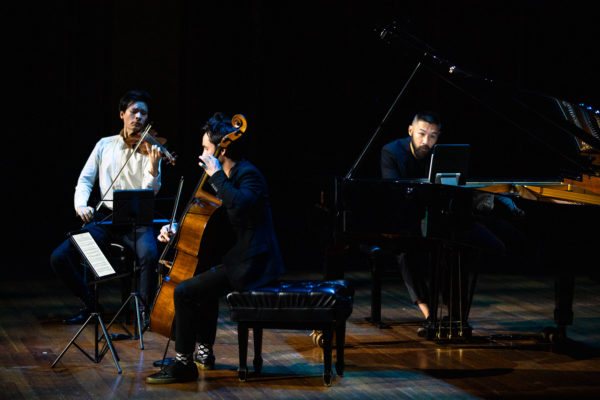Classical Concert Review: Celebrity Series Presents Junction Trio — Balancing Flair and Cohesion
By Aaron Keebaugh
This young, superstar trio is capable of being as cool as it is fiery, and the performers’ strengths bring out the best in each other.

Junction Trio at Jordan Hall. Photo: Robert Torres.
Chamber music may be the art of compromise. But violinist Stefan Jackiw, cellist Jay Campbell, and pianist Conrad Tao never lose themselves completely to what their repertoire—and ensemble—demand.
Instead, these musicians, known collectively as the Junction Trio, struck a perfect balance between flair and cohesion in their Celebrity Series recital Saturday night at Jordan Hall. They tempered their individual voices for uniform interpretations, but the exuberant music composed by Amy Williams, Maurice Ravel, Robert Schumann, and Thomas Morley gave each musician opportunities to shine momentarily on his own.
This young, superstar trio is capable of being as cool as it is fiery, and the performers’ strengths bring out the best in each other. Jackiw’s silvery tone provided an ideal foil for the smokey depths of Campbell’s cello. Through it all, Tao was a stalwart presence, soft and robust in his touch whenever the music called for it.
Amy Williams’s “Bells and Whistles” showcased the ensemble’s colorful whimsy. At 17 minutes, this Celebrity Series co-commission is filled with momentary delights. It opens with strings scratching out a gentle, clock-like rhythm. The sounds gradually coalesce in longer phrases and lines that build to a din. Tao enters the fray with arpeggios and runs that churn with a be bopper’s zeal. The music then smooths out to an effervescence, with Jackiw and Campbell’s sustains evaporating into clouds of pitches high in the ensemble’s range before fading into silence.
Though its interweaving of power and stasis compels, “Bells and Whistles” ultimately proves less than the sum of its parts, never quite making a statement that goes beyond entertaining gestures. The Junction Trio, however, clearly believes in this score, and they played it with panache.
They did the same with Ravel’s Piano Trio in A minor, a luminous piece that reflects the composer’s Basque roots.
In a reading of rapt intensity, Tao’s arpeggios ebbed and flowed while the dialogue between Jackiw and Campbell highlighted the orchestral-like dimensions of the outer movements. The Pantoum coursed with swagger; the Passacaille was a journey from darkness to light and back again.
The trio brought an uncommon warmth and reverence to Schumann’s Piano Trio No. 1 in D minor. Written as a companion to the more lyrical F major Trio, this work typically generates a stormy ebullience.
This performance had all of that, spread across a canvas that displayed the musicians individual strengths. Tao’s phrases in the opening movement crested and broke like waves. Whistle tones from Jackiw and Campbell glowed at a distance at movement’s end. Together, they nurtured the hymn-like serenities of the third movement, while the Scherzo and finale were contrastingly vigorous.
That blend of sensitivity and dynamic force provided the centerpiece for the ensemble’s arrangement of Thomas Morley’s “Christes Crosse” from 1608’s A Plaine and easie Introduction to Practical Musicke. The Junction Trio substituted this work at the last minute for the originally programed riff on Carlo Gesualdo’s “Tenebrae Responsorias” because, Campbell claimed, “it sounded terrible.”
But, while the more ear-soothing Morley takes fewer harmonic liberties, the music teems with rhythmic vitality. The players made it into a romp, with Tao and Campbell joining their phrases in witty dialogue around Jackiw’s fervent cantus firmus. In a concert packed with dramatic urgency, this short work came off as a brief but jovial conversation among friends.
Aaron Keebaugh has been a classical music critic in Boston since 2012. His work has been featured in the Musical Times, Corymbus, Boston Classical Review, Early Music America, and BBC Radio 3. A musicologist, he teaches at North Shore Community College in both Danvers and Lynn.
Tagged: Aaron Keebaugh, Conrad Tao, Jay Campbell, Junction Trio
